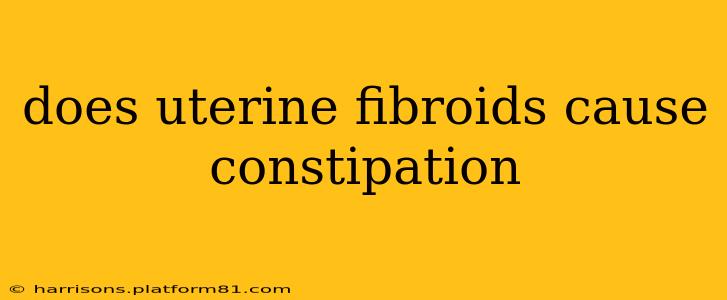Uterine fibroids, also known as leiomyomas, are noncancerous tumors that grow in the uterus. While not directly causing constipation, the presence of fibroids can indirectly lead to bowel issues, including constipation, in several ways. This article will explore the potential link between uterine fibroids and constipation, addressing common questions and concerns.
How Can Fibroids Affect Bowel Movements?
Several mechanisms explain the connection between fibroids and constipation. The most significant factors are:
-
Pressure on the Bowel: Large fibroids can put pressure on the intestines, especially the rectum and colon. This pressure can impede the smooth passage of stool, leading to constipation. The severity of constipation is often linked to the size and location of the fibroids. Fibroids located near the rectum are more likely to cause bowel problems.
-
Hormonal Imbalances: Fibroids are influenced by estrogen and progesterone. Hormonal fluctuations can affect bowel function in some women, potentially contributing to constipation alongside other symptoms. This is not a direct causal link but rather a contributing factor.
-
Pain and Discomfort: The pain associated with fibroids, including pelvic pressure and cramping, can make it difficult or uncomfortable to have a bowel movement, leading to avoidance and subsequently, constipation.
-
Medication Side Effects: Some treatments for fibroids, such as hormonal therapies, may list constipation as a potential side effect.
Can Fibroids Cause Severe Constipation?
While it's not unusual for women with fibroids to experience constipation, the severity varies greatly. For many, it might be mild and occasional discomfort. However, in some cases, particularly with large fibroids pressing on the bowel, constipation can become severe, leading to:
- Straining during bowel movements: This can exacerbate existing fibroid-related pain.
- Incomplete bowel emptying: The feeling of not completely emptying your bowels.
- Hard, dry stools: Making elimination more difficult and painful.
- Abdominal bloating and discomfort: Adding to overall discomfort.
Severe constipation should always be addressed by a healthcare professional.
What Other Symptoms Might I Experience with Uterine Fibroids?
Constipation is not the only symptom associated with uterine fibroids. Other common symptoms include:
- Heavy menstrual bleeding (menorrhagia): This is one of the most common symptoms.
- Prolonged menstrual periods (menometrorrhagia): Periods lasting longer than seven days.
- Pelvic pain or pressure: Often described as a dull ache or pressure in the lower abdomen.
- Frequent urination: Due to pressure on the bladder.
- Abdominal bloating: Often related to the size of the fibroids and their pressure on surrounding organs.
- Pain during intercourse (dyspareunia): Depending on the fibroid's location and size.
- Infertility: In some cases, fibroids can interfere with fertility.
When Should I See a Doctor About Constipation and Fibroids?
If you're experiencing persistent or severe constipation along with other symptoms suggestive of uterine fibroids, it's essential to consult a gynecologist or healthcare professional. They can perform a physical exam, possibly an ultrasound, to diagnose fibroids and discuss treatment options.
What are the Treatment Options for Uterine Fibroids and Related Constipation?
Treatment options for uterine fibroids, and consequently constipation related to them, depend on the severity of the symptoms, the size and location of the fibroids, and the patient's overall health. Options can include:
- Lifestyle changes: Increasing fiber intake, drinking plenty of water, and regular exercise can help alleviate constipation.
- Medication: Over-the-counter laxatives may provide temporary relief from constipation, but should be used judiciously and under medical supervision. A doctor may prescribe medications to manage fibroid symptoms or shrink the fibroids themselves.
- Minimally invasive procedures: Myomectomy (surgical removal of fibroids) or uterine fibroid embolization (UFE) are minimally invasive procedures that can address the underlying cause of constipation.
- Surgery: Hysterectomy (surgical removal of the uterus) may be considered as a last resort in severe cases.
Disclaimer: This information is intended for educational purposes only and should not be considered medical advice. Always consult with a qualified healthcare professional for any health concerns or before making any decisions related to your health or treatment.
